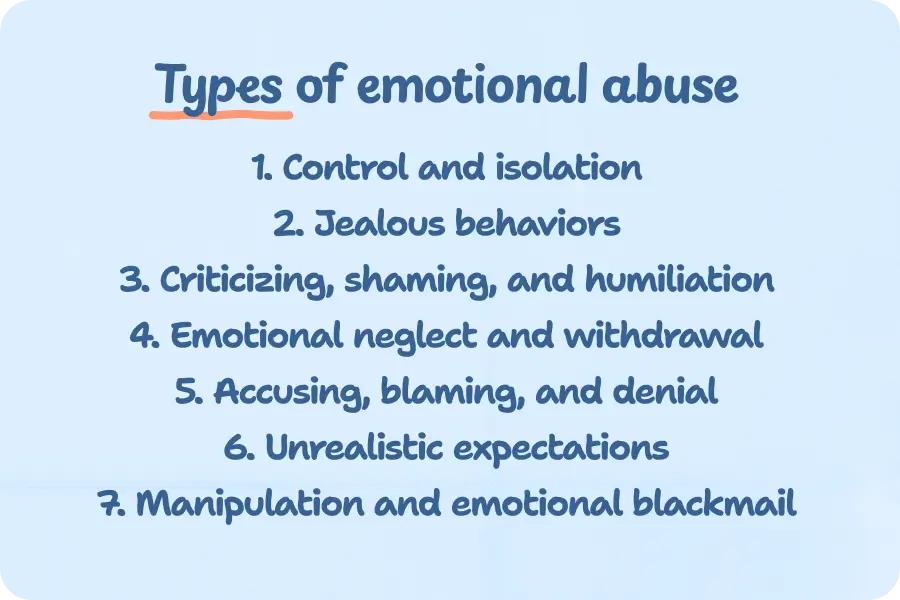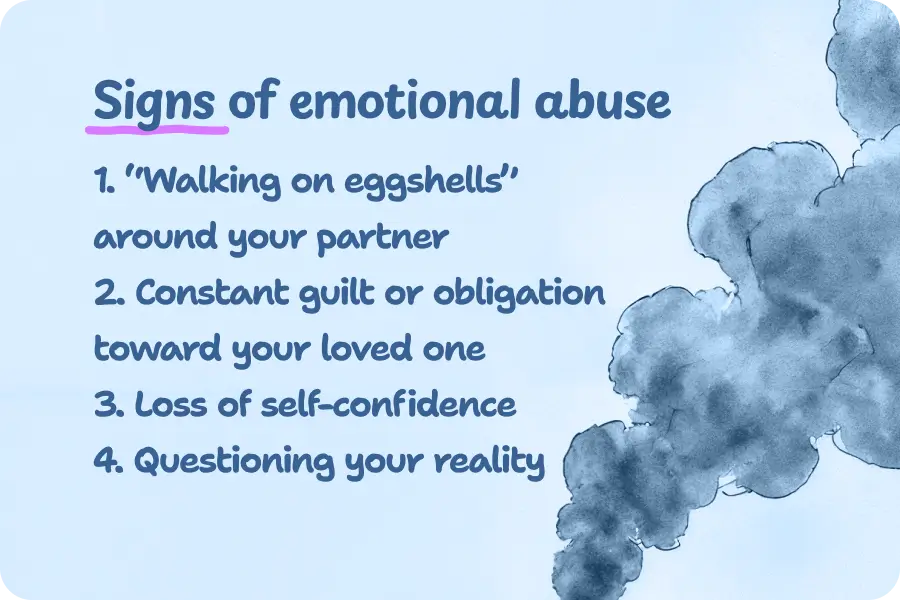All people may argue from time to time, as misunderstandings can be a normal part of any communication. However, emotional abuse is more than just regular disagreements. It’s a consistent pattern of behavior that one person might use to control the other. Unlike healthy conflict, which can lead to better understanding, emotional abuse creates an environment of fear.
In this article, we’ll learn more about abusive behavior, its signs, types, and examples. We’ll focus on ways to recognize partner abuse and cope with it as soon as possible.
Are you concerned that your partner might show narcissistic traits? Take this 5-minute free test to better understand their behavior and find out what to do with it.
Understanding emotional abuse
Emotional abuse is a form of non-physical behavior that is meant to gain control, isolate, and diminish a person’s sense of self-worth. Unlike physical abuse, it may show up through words or manipulative actions (such as criticizing your appearance, blaming you for everything that goes wrong, or making you feel guilty for spending time with someone else). A person can be emotionally abused by an intimate partner, family members, relatives, friends, co-workers, etc.
Studies have found that almost half of all women and men in the US have experienced psychological aggression by an intimate partner in their lifetime. [1] Abuse might develop gradually and be difficult to recognize immediately. It may begin with subtle remarks that don’t seem serious at first. With time, controlling behavior intensifies and becomes more emotionally draining.
Emotional abuse can affect not only mental health but also physical well-being and lead to anxiety or depression. Even more, those who experienced abusive relationships may develop stress-related conditions such as insomnia, headaches, or digestive problems.
Emotional abuse vs. mental abuse vs. psychological abuse
People can use these terms interchangeably without overthinking the difference between emotional and psychological abuse. However, there’s a subtle line between them.
| Emotional abuse | Psychological abuse | Mental abuse |
| Targets a person’s feelings and self-esteem. | Affects thinking patterns, perception, and decision-making. | A less formal term that covers both emotional and psychological harm. |
| Common examples are insults, humiliation, guilt-tripping, and constant criticism. | Examples include gaslighting, mind games, manipulation, and creating confusion or fear. | Can include any mix of emotional manipulation and controlling behavior. |
While the distinction exists, in practice, these categories overlap so heavily that these three terms can substitute for each other. In this article, we’ll use “emotional abuse” as the primary term for clarity and consistency, covering both cognitive and emotional influence.
Verbal abuse vs. emotional abuse
Experiencing emotional abuse isn’t only about yelling, insults, or threats but covers a much wider spectrum of behaviors. As such, verbally abusive behavior can be a subtype of an emotional one. But emotional abuse means creating a power imbalance not only through words but also through actions.
| Aspect | Verbal abuse | Emotional abuse |
| Meaning | Use of words to intimidate or harm someone. | Behaviors that undermine self-worth and mental health. |
| Main focus | Spoken or written words. | Both words and actions. |
| Examples | Insults, yelling, name-calling, and threats. | Gaslighting, silent treatment, isolation, and guilt-tripping. |
How emotional abuse differs from normal conflict in relationships
Emotional abuse is a consistent pattern that aims to disregard personal boundaries and to exert control over the other person’s actions. Abusive behaviors destroy self-esteem, can cause self-doubt, and tend to only escalate over time.
Normal conflicts occur occasionally due to disagreements and can be resolved when the problem is fixed. In healthy romantic relationships, partners respect each other’s boundaries during arguments, so conflicts rarely cause long-term harm to self-esteem.
8 types of emotional abuse
Emotional abuse doesn’t leave bruises or scars you can see. That’s why it’s important to know the common patterns of this behavior. They can help you spot warning signs that you might not notice right away.
1. Control and isolation
Abusive people aim to establish control over their victims and make them depend on them by limiting communication with friends, co-workers, and family members. This might include the following:
- Demanding to quit the job, stop spending time with friends, or even stop visiting your parents’ house.
- Attempts to forbid you from earning your own money (financial abuse).
- Using threats or emotional manipulation to make you stay at home.
- Demanding that you share your location without sharing theirs in return.
- Monitoring your online presence: asking for your socials’ passwords, reading your messages, and forcing you to delete some content.
2. Jealous behaviors
Making you feel guilty for talking to the opposite sex is another way to limit contact. An abuser can accuse you of flirting, trying to find another partner, or prioritizing others over them, even if it isn’t true.
Not only your friends, but also your boss, colleagues, or even a plumber who stopped by to fix something can be perceived as dangerous. “You look at him too much,” or “Why are you smiling at her?” can be typical comments.
In some cases, jealousy can grow even further and lead to controlling your interactions with mum, dad, and close relatives. “You spend too much time with them!” is another phrase to control you.
3. Criticizing, shaming, and humiliation
Another strategy that emotionally abusive people may use is diminishing their partner’s inner balance. Instead of being supportive loved ones, their goal is to make you feel hopeless. “No one except me will love you” is the kind of phrase they will try to make you believe in. At the same time, they can:
- Make you experience public embarrassment: make jokes at your expense and turn serious matters into “humor” in front of others.
- Criticize everything you say, trying to prove that they’re always right.
- Constantly highlight your “flaws” (from experience to specific habits).
- Dismiss your achievements and compare all your actions to others’.
This behavior can make you feel unsafe when saying or doing almost anything. As a result, a person experiencing emotional abuse can try to “become invisible” to avoid conflict.
4. Emotional neglect and withdrawal
Silent treatment and withholding affection are typical strategies of people trying to reach coercive control. They want their close one to do everything in the way they want, and once something goes wrong, they can immediately withdraw and stop giving attention.
This creates an atmosphere of uncertainty where love feels conditional and fragile. If the partner has experienced child abuse and neglect before, the situation can be even more traumatizing as it repeats previous patterns. As a result, an abused person might begin to fear making mistakes and experience constant anxiety.
5. Accusing, blaming, and denial
Shifting responsibility is also typical for abusive relationships. Imagine a situation: your partner has lost the car keys somewhere in the supermarket. Instead of getting back and looking for them, they might insist that you distracted them or even claim you’re the one who lost the keys.
Blaming you for all their failures can become recurring. At the same time, they may deny their mistakes or pretend certain incidents never happened, which can even turn into gaslighting.
6. Unrealistic expectations
To harm your self-esteem, an emotionally abusive partner or parent can set standards that are impossible to meet. This is particularly typical for narcissistic partners who want their loved ones to be perfect while refusing to accept that they have flaws as well. Narcissistic traits can include the following:
- Criticizing you for not looking the way they want.
- Saying “You’ve gained weight,” even though it might not be true.
- Expecting you to predict their mood without them saying a word.
- Being dissatisfied with everything you do (e.g., cleaning, cooking, planning a vacation, etc.), no matter how hard you try.
7. Manipulation and emotional blackmail
They can use your fear and vulnerability to get what they want. Emotionally abusive people may try to control your decisions, force you to do all the housework, pay for the life of your couple (while they don’t work at all), or take responsibility for their mental well-being.
At the same time, they might use subtle pressure and phrases like “Don’t you love me?” or “You don’t care about our relationship at all” to manipulate your feelings. They might even shame you for setting boundaries, as “there shouldn’t be any limits between us.”
8. Subtle forms of emotional abuse that people may overlook
- Backhanded compliments
- Hiding important information
- Withholding affection
- Constant “jokes” at your expense

How to recognize if you’re experiencing emotional abuse
To understand whether you deal with the signs of emotional abuse, look more closely at what the person does. Neglecting your needs, constantly criticizing you, and trying to control you are also warning signs.
Talk with your support network. These might be friends, colleagues, or a mental health professional. Sharing your experiences can help you gain a new perspective and recognize patterns that may be difficult to see on your own.
You can also try Breeze. A mood tracker can help you notice your feelings and their causes. For instance, being frustrated or frightened every time you communicate with your partner can be the first warning sign of an abusive relationship. At the same time, the gaslighting check and narcissistic partner test will let you find out whether the behavior you face matches common patterns of abuse.
4 signs of emotional abuse
Apart from behavioral patterns, it’s also important to pay attention to how you feel when communicating with a loved one. In particular, signs of emotional abuse can include the following:
1. “Walking on eggshells” around your partner
You fear that they might criticize you, neglect your worries, or humiliate you right in front of co-workers or family members. When you do everything in the way they want, the situation seems pretty stable. But you’re afraid of doing something wrong because it can turn into another argument or trigger silent blame or name-calling.
2. Constant guilt or obligation toward your loved one
You feel like you need to do better, get better, and do your best to make your loved one feel satisfied. You must respond to their text messages immediately, meet them with a three-course meal every day after work, or try to meet their sky-high standards. However, whatever you do, you still feel guilty for “not being enough.” And an abusive partner won’t miss any chance to remind you about it.
3. Loss of self-confidence
Wounds in a relationship and experiencing constant coercive control can make you lose your inner sparkle. As a result, you might feel like a shadow of your former self: the one who gave up hobbies, desires, and goals to avoid conflict. Yet, in reality, you’re still being criticized, which leads to even further frustration.
4. Questioning your reality
When you start thinking whether there’s something wrong with your memory and appreciation of the world around you, it can signal that you’re in a relationship with a gaslighter. This person’s goal is to make you confused and create psychological distress. As such, everyday decisions feel overwhelming, and you start doubting your worth and abilities.

Examples of emotional abuse behaviors
Abusive situations can be different, but they directly influence how you feel about yourself and the world around you. Think about whether you’ve experienced some of the following.
In relationships
- Love-bombing and devaluation cycles. One day, they say, “I’ve never met anyone like you; you’re perfect in every way,” and the next day, they state that your whole relationship was a mistake.
- Every time you spend time away from your partner, you get bombarded with questions afterwards. This doesn’t refer to healthy worrying about whether you were okay when you didn’t answer your phone for a while. Rather, it’s an attempt to control your contact with the outside world.
- They criticize your friends or family, making you feel guilty for keeping those connections. “They didn’t achieve anything,” or “They are weird.” If you’ve ever heard something like that, it might be a warning sign.
In family
The research has found that childhood emotional abuse across childhood up to age 18 can reach 35%. [2] This means that every third kid in the world might experience abusive behavior from parents, relatives, or other people around. These can include:
- Ignoring a child’s feelings, needs, or achievements. No matter how many A’s you got or sports competitions you won, you’ve always felt invisible. If parents’ love depended on how well you performed at school, it might have been one of the signs of emotional abuse.
- Using shame and public embarrassment as discipline. Close ones could make fun of you if you did something wrong or call you names in front of relatives or classmates. Instead of correcting mistakes with care, they used humiliation to control behavior.
- Constant comparison. If your mum’s friend’s daughter knew math better than you, it could have become a reason to highlight your failure. Furthermore, in such families, kids may need to be better than all children around in almost anything without the right to make any mistakes.
At work
According to the International Labour Organization, almost 23% of employees have experienced violence and harassment at work, including physical, psychological, or sexual abuse. [3] Here’s how emotionally abusive behavior from colleagues or managers can manifest.
- Publicly criticizing you during meetings. Even when you’ve done everything correctly, you can still hear that you don’t work enough or that your impact isn’t so important.
- Setting unrealistic deadlines or workloads. If a manager engages in abusive behavior, they can push you to your limits as a way to pressure or punish. And even when you manage to meet those demands, they may still find flaws.
- Taking credit for your ideas. When you participate in a certain project or do something important, they might pretend that this is completely their achievement, thereby undermining your role.
Have you ever experienced something similar to emotional abuse?
The impact of emotional abuse
Experiencing abuse for some time can affect both your mental and physical health. In particular, you might:
- Live with persistent anxiety and feel worried about the abuser’s reactions and the future of your relationship.
- Develop PTSD, as studies prove that psychological abuse is a stronger predictor of post-traumatic stress disorder in women than even physical abuse. 7 out of 10 women who are psychologically abused may display PTSD symptoms. [4]
- Experience severe self-esteem problems that can make you doubt your worth.
- Risk of developing depression and other mental health conditions. [5]
Could you please explain what other problems in daily functioning a person who experiences emotional abuse might face? Emily Mendez, M.S., Ed.S, answers, “A person who has experienced emotional abuse may face many challenges in their daily life. Because of the abuse, their self-esteem may be really low. This might keep them from going after opportunities at work. They may feel as though they are no good at things. The stress may cause them to have a difficult time concentrating and focusing. They may second-guess their own choices. Even self-care may be difficult, as they may believe that they don’t deserve it.”
Coping with emotional abuse
To deal with psychological distress you may experience when communicating with an abusive person, it’s important to create distance. Save some practices that might be helpful.
Steps to take
- Stop self-blame. The goal of an abuser is to harm your emotional state. Remember that someone’s actions or words don’t define your value. Instead, accept that you’re important as you are and try to build communication from this position.
- Set boundaries. Communicate what behavior is unacceptable to you. An abusive person may attempt to ignore this or test your limits. However, if you stop the conversation every time they do it, this reduces their control over you.
- Seek social support. You need people who can share your worries and provide real help if necessary. For instance, if emotional abuse leads to domestic violence, agree with someone that you’ll contact them immediately. This way, you’ll feel much safer and have someone to rely on.
Expert Insight
“Coping with emotional abuse can be extremely difficult when you are still in the situation. The priority should really be on making a safe exit plan. In the meantime, there are some things you can do.
Try grounding techniques to help you calm down when you are anxious. These can be things like mindfulness meditation. Strengthen your support network if possible. Attend therapy. A therapist can help you understand that the abuse is not your fault. Prioritize self-care when you can. You deserve it. Try to get adequate rest. Maintain basic hygiene and find small moments of joy in your life.not alone on this path. Try Breeze and start your healing journey today!”
Emily Mendez
Mental health professional
What you shouldn’t do
Don’t try to argue with an abuser or, on the other hand, make excuses for everything you do. The first one could be dangerous for you. The second one, in turn, will harm your self-esteem even further and won’t be very helpful.
Leaving an emotionally abusive relationship
Breaking up with an abusive partner is a brave decision that can change your life for the better. At the same time, it’s vital to approach it seriously to ensure your emotional and physical safety.
Create an exit plan
A person exhibiting abusive tendencies can become aggressive when they find out you want to leave them. As such, it can make sense to prepare step by step.
- Collect important documents and set aside some money.
- Pack your belongings secretly.
- Decide on a safe place you could stay.
- Share your plan only with trusted people who can support you.
While breaking up with someone through text message isn’t always the best idea, in this case, it can be safer than meeting face-to-face. Even more, this will let you stick to your decision instead of being persuaded by the classic promises like “I will change.” Abusers may use these words to keep control, not because they truly plan to change.
But in case you decide to meet in person, please discuss this plan with your loved ones. Say something like, “I need to meet them today. Can you call me in an hour to check if I’m safe?” You can also ask a friend to wait nearby or arrange the meeting in a public place.
Call a national domestic violence hotline
If an exit plan doesn’t work as it was meant to or your partner behaves aggressively, you need to reach out for help immediately. The National Domestic Violence Hotline 1-800-799-7233 is available 24/7 for confidential support.
Healing from emotional abuse
It can take some time to feel better and recover from abusive relationships. However, it’s absolutely possible with the right support and self-care. This is how to make this process faster.
1. Cut off contact with the abuser
If you keep communicating with a person you’ve been in romantic relationships with, it can make you think about getting back together. Abusers can become caring, lovely, and gentle to make their victims believe that they’ve changed. Nevertheless, the reality may be rather different.
To avoid the pain of constant hesitations and memories, it’s better to cut off contact or at least limit it. Block their number, unfollow them on social media, and avoid places where you might meet. This creates the emotional space that you need to heal.
2. Accept that it was impossible to “fix” them
If you believe that you would be able to help a person change, it may be better to give up this idea. It isn’t your responsibility to “fix” or “save” another person, especially as the desire for change should stem from the one with abusive tendencies. On the other hand, you can always focus on your life and save your self-esteem and future from the never-ending emotional rollercoaster.
3. Don’t enter another relationship too quickly
You may want to fill the emptiness by flirting with or even dating another person. However, it might be a bad idea. When you start another relationship quickly, you don’t leave yourself room to reflect, analyze what happened, and determine what patterns you need to avoid in the future. Instead, it can be better to focus on yourself and rebuild your sense of self-worth before starting something new.
4. Surround yourself with supportive people
There can be times when you feel lonely or start doubting your decisions, but remember that you’re not alone. Your friends and loved ones can stay with you in tough moments. There might also be support groups in your city that provide help to people who have experienced emotional abuse. The most important thing is not to isolate yourself but to share your worries as many times as you need to.
5. Contact a mental health professional
Experiencing emotional abuse can lead to mental health challenges that shouldn’t be ignored. So, if it’s tough to handle your feelings alone, you can always get in touch with a therapist who will help you rebuild self-esteem and feel more in control of your life.
Frequently asked questions
Am I being abused?
To understand whether you experience emotional abuse, think about whether your partner or a loved one:
- Tries to control you
- Manipulates your decisions
- Humiliates you, especially in front of others
- Criticizes you even for minor mistakes
- Neglects your needs
- Isolates you from your support network
- Sets up unrealistic expectations
- Monitors your phone messages, online behavior, and location
If several of these behaviors feel familiar, there’s a high chance you experience emotional abuse.
Can yelling be psychological abuse?
Yes, if someone exhibits verbal aggression quite often and without a clear reason, it can be a sign of emotional abuse. At the same time, if you occasionally yell at each other during an argument (and it isn’t your typical behavior), yelling shouldn’t automatically be considered abuse.
The difference lies in frequency, intent, and impact. Abusive yelling is persistent and meant to control rather than express temporary frustration.
How do I heal after experiencing abuse?
You can start by limiting your communication with an abuser and accepting the fact that it was impossible to change the other person. Then, process the experience before entering new relationships. Connect with people who can support you, or reach out to a mental health professional.
Sources
- Black, M.C., Basile, K.C., Breiding, M.J., Smith, S.G., Walters, M.L., Merrick, M.T., Chen, J., & Stevens, M.R. (2011). “The National Intimate Partner and Sexual Violence Survey (NISVS): 2010 Summary Report.” Atlanta, GA: National Center for Injury Prevention and Control, Centers for Disease Control and Prevention.
- Ben Mathews, Shanta Dube. “Childhood emotional abuse is becoming a public health priority: Evidentiary support for a paradigm change.” Child Protection and Practice. 2025
- International Labour Organization. “Experiences of Violence and Harassment at Work: A first global survey.” 2022
- National Coalition Against Domestic Violence. “Facts about Domestic Violence and Psychological Abuse.” 2015
- Radell ML, Abo Hamza EG, Daghustani WH, Perveen A, Moustafa AA. “The Impact of Different Types of Abuse on Depression.” Depress Res Treat. 2021
Disclaimer
This article is for general informative and self-discovery purposes only. It should not replace expert guidance from professionals.
Any action you take in response to the information in this article, whether directly or indirectly, is solely your responsibility and is done at your own risk. Breeze content team and its mental health experts disclaim any liability, loss, or risk, personal, professional, or otherwise, which may result from the use and/or application of any content.
Always consult your doctor or other certified health practitioner with any medical questions or concerns
Breeze articles exclusively cite trusted sources, such as academic research institutions and medical associations, including research and studies from PubMed, ResearchGate, or similar databases. Examine our subject-matter editors and editorial process to see how we verify facts and maintain the accuracy, reliability, and trustworthiness of our material.
Was this article helpful?








